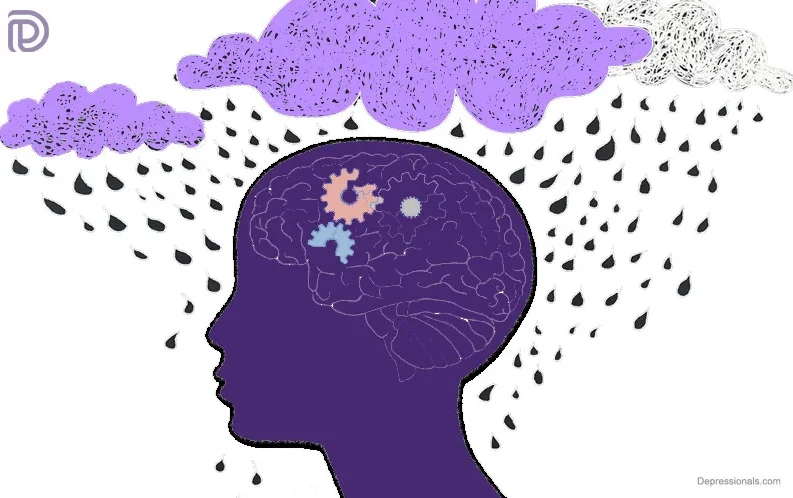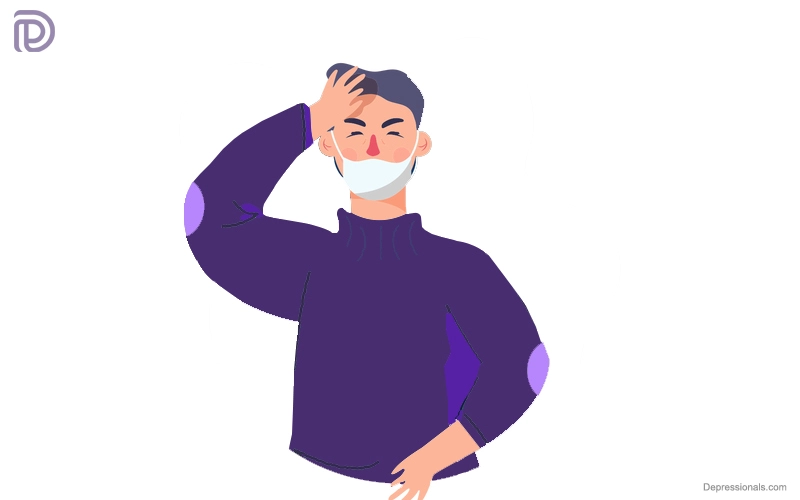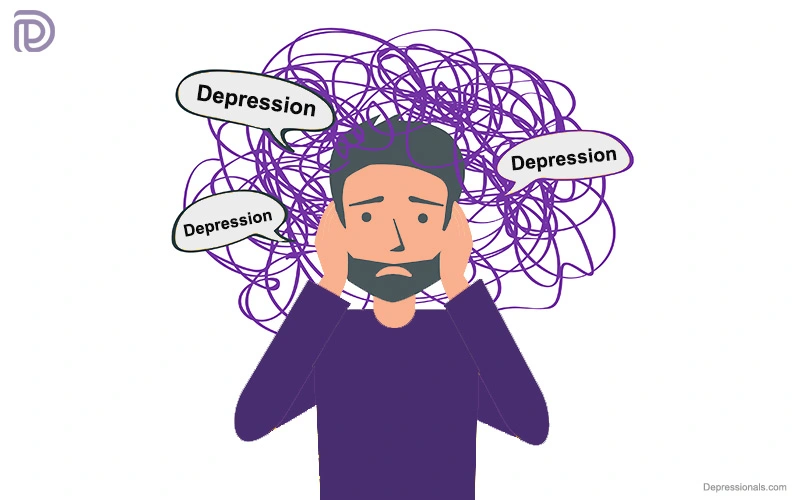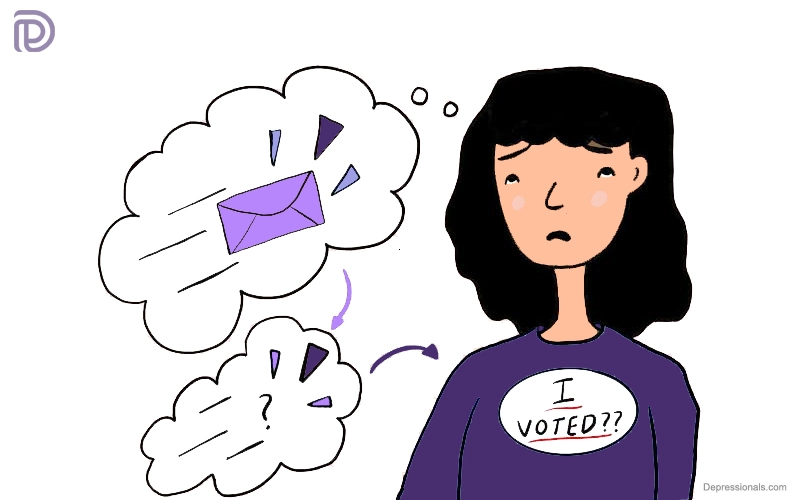Feeling down isn’t depression. You may experience a physical change in your brain. Because depression effects on brain.
It can affect your thoughts, feelings and actions. These changes aren’t understood by experts. Inflammation, genetics and stress might also play a role.
You should seek help if you are depressed. You become more and more damaged over time as a result of repeat episodes. If you seek treatment early, you may be able to avoid or alleviate some of the following problems.
In 2016, 16.2 million Americans experienced a major depressive episode.
Depression can affect a person physically as well as psychologically. Inflammation, oxygen restriction, and shrinkage are all examples of physical changes. Depression can affect your nervous system’s central control center.
Here is information on how depression can change the brain, and what you can do to prevent it from occurring.
Related: Mild, Moderate and Severe Depression
How does depression change your brain?
What are the effects of depression on the brain? Unfortunately, there is no simple answer to this question since depression has such complex effects on the brain. Furthermore, we still don’t understand all that there is to know about how our brains affect depression, which is why they continue to be studied. Researchers have established a foundational understanding of how depression affects the brain, despite still having much to learn about depression’s cause, effect, and correlation.
There is a strong correlation between depression and brain inflammation. Inflammation in the brain may cause depression, but we do not know if depression causes inflammation.
The loss of gray matter volume (GMV) has been shown to affect multiple areas of the brain directly due to depression. Brain material that consists of dense cells is called gray matter.
Brain shrinkage

Recent research indicates that depression can impact the size of specific brain regions.
Depression can shrink specific brain regions, but how much shrinkage may occur is still being debated by researchers. But current studies indicate that these areas of the brain may be affected:
- Hippocampus
- Thalamus
- Amygdala
- Frontal
- Prefrontal cortices
Depressive episodes last for an extended period of time and shrink these areas accordingly.
For example, hippocampus changes can be seen anywhere from eight months to a year during a single episode of depression or a series of shorter episodes. The brain functions linked to a certain section shrink together when a part of it shrinks.
As an example, the prefrontal cortex and amygdala work together to regulate our feelings and recognize others’ feelings. People who suffer from postpartum depression (PPD) may be unable to empathize as much.
Read: Double Depression Disorder
Brain inflammation
Inflammation and depression are also linked in new ways. Depression may cause inflammation or inflammation may cause depression.
Although depression is associated with brain inflammation, the duration of depression is also tied to the occurrence of inflammation in the brain. People who have been depressed for over ten years suffer from 30 percent more inflammation than those who have been depressed for three or fewer years.
As a result, persistent depressive disorder exhibits significant brain inflammation.
Inflammation of the brain can cause the brain’s cells to die, which can result in a variety of complications, including:
- Shrinkage (explained above)
- Neurotransmitter function is decreased
- Age-related reduction in brain plasticity (neuroplasticity)
These dysfunctions can be caused by:
- Brain development
- Learning
- Memory
- Mood
Related: Mood Disorders
Oxygen restriction
Oxygen deficiency is associated with depression. Depression may cause these changes in breathing, but it is unclear which cause and which comes first.
People with major depressive disorder and bipolar disorder have elevated levels of a cellular factor generated in response to a lack of oxygen in the brain (hypoxia).
A reduction in oxygen in the brain can lead to:
- Inflammation
- Brain cell injury
- Brain cell death
Our study has shown that inflammation and cell death can lead to various symptoms that affect development, memory and mood. Hypoxia even experienced temporarily can lead to confusion, as witnessed by high-altitude hikers.
Researchers have found that hyperbaric oxygen therapy can help alleviate depression symptoms in humans.
Read: Situational Depression
Structural and connective changes
Depression also affects the brain’s structure and connective tissue.
Some of these include:
- Symptoms of reduced hippocampal function. This can lead to memory loss.
- Prefrontal cortex function is reduced. As a result, the person can be prevented from completing tasks (executive function) and have trouble paying attention.
- Amygdala function is reduced. Mood and emotional regulation can be directly affected by this.
- Thalamus. The thalamus receives most sensory information in the brain. Many high-level functions are handled by it, including speech, thought, behavior, learning, and movement. When a person suffers from depression, their thalamus can shrink due to the link between sensory input and feelings.
- Caudate Nucleus. Movement is the primary function of the caudate nucleus. However, it also plays tangential roles in learning, memory, motivation, emotion, and romantic relationships. Evidence shows that depression causes the caudate nucleus to shrink.
- Insula. Basic and automatic functions are assisted by the insula. There are many things that it can affect, including our feelings of love, pain, cravings, overall emotions, and addiction. The organ transmits sensory signals both from inside and outside the body. Our sensory experiences and emotional responses are linked together by the insular cortex. Additionally, it regulates taste and immunity. The insula appears to be smaller in depressed people as well as the prefrontal cortex, thalamus, and caudate nucleus.
It typically takes at least eight months for changes to be introduced.
Several factors contribute to persistent dysfunction in memory, executive functioning, mood, attention, and emotional regulation after longer bouts of depression.
Are the changes permanent?
Major depressive disorder (clinical depression) has been studied for a long time, but the long-term effect on the brain is still unknown, as well as what type of effects one can expect in the long run. However, research indicates they may be long-lasting.
There can be a negative impact on the brain from depression at any level, but persistent or repeated depression can be particularly damaging. Several studies suggest that depression compounds its effects on the brain over time, and some of these changes (such as those to the hippocampus) may persist even after years of depressive episodes in people with lifelong major depressive disorder.
In addition, depression is associated with an increase in translocator proteins. Studies indicate that these chemicals cause inflammation in the brain, and they are associated with:
- Cells in the brain are killed or damaged
- Prevent the emergence of new ones
- Affect the ability to think
- Increase brain aging
Increasing aging and reduced new growth can still result in lifelong consequences, even when levels return to normal. Our brains are definitely likely to change over time if we are dealing with ongoing depression.
What can I do to prevent these changes?
The steps above can also serve as a way to prevent or minimize the changes listed above since there are various ways to treat the symptoms of depression.
Some examples are:
Getting help to prevent depression effects on brain
Asking for help is very important. In particular, the stigma surrounding mental illness prevents many people from seeking help.
We can help society move away from the stigma associated with depression if we understand that it is a physical disease, as we’ve discussed above.
Whenever you feel depressed, remember that you are not alone and that it is not your fault.
The use of cognitive and group therapy, particularly those that incorporate stress-relieving mindfulness techniques, can be an excellent way of overcoming stigma and finding support. Even depression symptoms have been treated with them.
Related: Corona Virus Effects on Brain
Taking antidepressants
You may wish to consider antidepressants if you’re suffering from a depressive episode. Including them in your treatment plan can be beneficial for reducing these physical side effects, as well as depression.
It is possible to treat both your physical symptoms and your depression with a combination of psychotherapy and antidepressants.
Stress reduction
If you are not depressed, preventing the onset of a depressive episode is the best way to avoid these brain changes. Psychological stress has been linked to many forms of depression, including major depression.
If you want to help someone reduce their stress level, just asking them to do so may seem impossible or overwhelming, but there are fairly simple things you can do. You are not alone if you’re depressed, and there are a lot of mental help resources out there to help you. Take a look at: NAMI HelpLine
Conclusion
It almost always takes a toll on your mental as well as physical health to suffer from depression. Depression-related hormones cause brain damage, emotional instability, sleep disturbances, and cognitive impairment.






As soon as I noticed this web site I went on reddit to share some of the love with them.
In this great pattern of things you actually get an A+ with regard to effort. Where you confused everybody ended up being on all the specifics. You know, they say, details make or break the argument.. And that could not be more correct in this article. Having said that, permit me reveal to you precisely what did deliver the results. The writing is highly convincing and this is most likely the reason why I am making the effort in order to comment. I do not really make it a regular habit of doing that. Secondly, although I can certainly see the jumps in reason you come up with, I am not really confident of just how you appear to unite the points which in turn make the actual conclusion. For right now I will, no doubt subscribe to your issue but wish in the foreseeable future you actually link your facts much better.